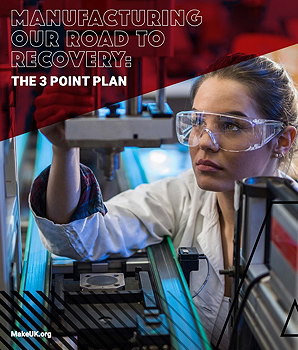UK manufacturers propose three-point plan for recovery

The British manufacturers’ body, Make UK, has published a three-point plan calling on the Government to give manufacturers time to scale up their operations and recover by extending the Coronavirus Job Retention Scheme (JRS) in a more flexible form, using part- or short-time working patterns, during the critical rebuilding phase.
The plan, called Manufacturing our road to recovery, comes after a Make UK survey revealed that more than a third of British manufacturers (37%) do not expect trading conditions to return for normal for 6-12 months after Covid-19 crisis ends. And a further 17% say it will take more than a year to recover.
The survey of 297 UK manufacturers, conducted at the end of April, shows that 87% of them have continued to operate in some form during the lockdown. But 77.5% report a fall in sales, while 80.6% say that their orders have dropped. For 22.1% of the companies surveyed, orders have fallen by 26–50%, while 19%, report that the fall had been 50–75%.
As with other sectors of the economy, manufacturers have made significant use of the Government’s Job Retention Scheme to keep key staff. Almost a fifth of companies (19%) have furloughed 11–25% of employees, while 15.9% have furloughed 26–50% of staff.
The survey also reveals that returning staff to work from furlough is likely to take a while, with 32.9% of companies saying they will wait to see their orders increasing first, and 25.3% reporting that it will be a phased process.
Make UK believes the Job Retention Scheme will need to be extended and to be more flexible to support a recovery. Previous levels of output can only return by reopening retail outlets – including vehicle sales – to create demand, and for consumers to get back to normal spending patterns to provide a market for the goods produced across the manufacturing supply chain.
Make UK’s three-point plan would work in tandem with a series of other measures to stimulate demand to get manufacturing and the UK’s economy truly back on track. Its three key demands are to:
1. Boost economic support
The report gives several examples of how this could be achieved including:
• A future factory investment scheme with up-front financing for labour and raw materials, and tax incentives to encourage automation, digitisation and export growth. The report also suggests a scrappage scheme for old IT equipment, plant and machinery to incentivise firms to invest in new technologies. It says that the challenge of returning to work will give the UK an opportunity to adapt to the Fourth Industrial revolution.
• A wheels-to-work scheme to support the rent/purchase of bicycles, mopeds and so on for rural commuters if there are few public transport alternatives or if social distancing prevents public transport provision.
• A retail online vouchers scheme to help small enterprises to get online. The vouchers would help companies to sell their goods and services online during this difficult period alongside a package of incentives and regulatory reforms to encourage greater use of delivery robots and drones to help SMEs meet demand for their goods in a safe way.

2. Ensure a safe return to work
• Access to PPE (personal protection equipment) for employees without denying supply to the NHS, care sector and other essential services.
• Greater flexibility for the Job Retention Scheme (JRS) to allow workers with health and safety skills that are vital to re-starting production, to be returned to the workplace in a staggered way and help prevent a delays to manufacturers’ production cycles.
• A review by the HSE into wider workplace regulations to see what might be sensibly amended so as to allow differential operation during this unusual period.
3. Build resilience
• A comprehensive supply-chain mapping project to ensure we have a greater understanding of their vulnerabilities, including transport/logistics.
• Additional fiscal incentives to ensuring critical industrial R&D capacity and spend is safeguarded.
• A Global Supply Chain resilience programme to keep markets open and predictable.
Commenting on the plan, Make UK chief executive, Stephen Phipson says that while industry had welcomed the initial critical financial support from Government “now, as we move into the recovery stage, the right response is to focus on supporting the business sector with measures designed to stimulate demand and ensure manufacturers can get back to supplying the goods consumers want and our country needs.
“We are calling for a flexible recalibration rather than a cliff-edge shock by allowing the JRS to continue its support,” he adds, “but in a way that enables manufacturers to get back to work in a way that lets them recover as they bring staff back as order books grow and production levels and supply chains to return to normal.
“It is likely that an immediate end to the JRS for manufacturers timed simply to coincide with the easing of lockdown arrangements would be highly premature and could have devastating effects on employment levels within manufacturing,” Phipson points out. “A more sophisticated, flexible and tapered approach to this funding would have a huge positive impact on confidence and help ensure that the sizeable national investment already made in the JRS was maximised and not wasted.”





